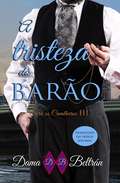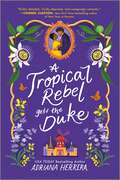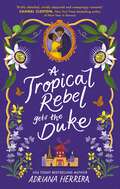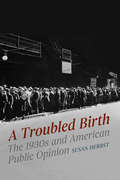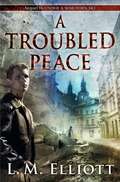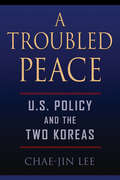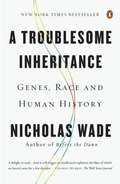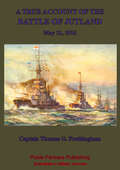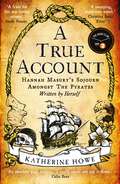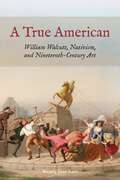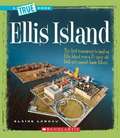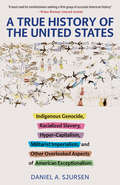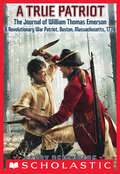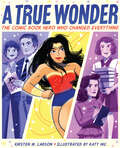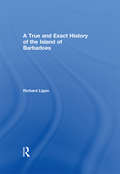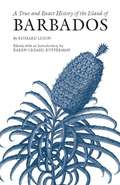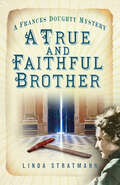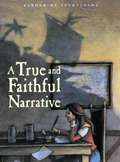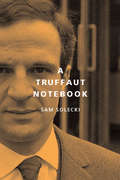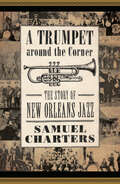- Table View
- List View
A Tristeza do Barão: FICÇÃO / Romance / Regência
by Dama BeltránDizem que uma paixão juvenil nunca é esquecida, talvez porque seja pura e real o suficiente. Depois de anos procurando Anais Price, sonhando em tê-la novamente ao seu lado, Federith Cooper precisa se casar com Lady Caroline, já que ela carrega o filho de ambos no ventre, ou assim ele pensa. Mas sua vida de casado é o inferno; sua esposa rejeita sua presença, sua ternura e até sente repulsa por ele, o homem mais educado e respeitoso de Londres. Federith tenta assimilar a vida que o tocou, embora... por quanto tempo ele possa manter o comportamento frio e aristocrático que seus pais o ensinaram quando criança, quando o amor de sua vida reaparece anos depois? Um amor verdadeiro não desaparece com o tempo, e a promessa que ele fez para protegê-la, cuida-la dela e amá-la, tão pouco.
A Triumph for Flavius
by Caroline Dale SnedekerA Roman General presents his young son Flavius with a Corinthian slave named Ariphron to serve as his pedagogue. Flavius grows to see Ariphron not as a slave but as a trusted friend.
A Tropical Rebel Gets the Duke (Las Leonas)
by Adriana HerreraHe's not like other dukes…Paris, 1889Physician Aurora Montalban Wright takes risks in her career, but never with her heart. Running an underground women&’s clinic exposes her to certain dangers, but help arrives in the unexpected form of the infuriating Duke of Annan. Begrudgingly, Aurora accepts his protection, then promptly finds herself in his bed. New to his role as a duke, Apollo César Sinclair Robles struggles to embrace his position. With half of society waiting for him to misstep and the other half looking to discredit him, Apollo never imagined that his enthralling bedmate would become his most trusted adviser. Soon, he realizes the rebellious doctor could be the perfect duchess for him. But Aurora won&’t give up her independence, and her secrets make her unsuitable for the aristocracy.When dangerous figures from their pasts return to threaten them, Apollo whisks Aurora away to the French Riviera. Far from the reproachful eye of Parisian society, can Apollo convince Aurora that their bond is stronger than the forces keeping them apart? Can't get enough of the Las Leonas? Book 1: A Caribbean Heiress in Paris Book 2: An Island Princess Starts a Scandal Book 3: A Tropical Rebel Gets the Duke
A Tropical Rebel Gets the Duke: Discover the sexy, feminist historical romance from bestselling author Adriana Herrera (Las Leonas series, Book 3)
by Adriana Herrera'Ferociously feminist and sensual, with a dreamily diverse cast' HELEN HOANG'Historical romance at its very best - fresh, lush and full of steam!' SOPHIE JORDAN❤️🔥He's not like other dukes . . . Paris, 1889Physician Aurora Montalban Wright takes risks in her career, but never with her heart. Running an underground women's clinic exposes her to certain dangers, but help arrives in the unexpected form of the infuriating Duke of Annan. Aurora begrudgingly accepts his protection, then promptly finds herself in his bed. New to his role as a duke, Apollo César Sinclair Robles struggles to embrace his position. With half of society waiting for him to misstep and the other half looking to discredit him, Apollo never imagined that his enthralling bedmate would become his most trusted adviser. Soon, he realizes the rebellious doctor could be the perfect duchess. But Aurora won't give up her independence, and her secrets make her unsuitable for the aristocracy.When a dangerous figure from their past returns to threaten them, Apollo whisks Aurora away to his villa in the French Riviera. Far from the reproachful eye of Parisian society, can Apollo convince Aurora that their bond is stronger than the forces keeping them apart? 💕Why readers LOVE Adriana Herrera . . . 💕'A breath of fresh air featuring everything I love about historical romance' MARTHA WATERS, author of To Love and to Loathe'A triumph!' SARAH MACLEAN'A lush, vivid romance, highly recommended' EVIE DUNMORE'A pure delight from start to finish . . . this peek into the glittering world of the Belle Époque will leave you breathless' JOANNA SHUPE'Lush settings, rich characters, and that familiar feeling of West Indies' allure will steal your heart' VANESSA RILEY'An enchanting and unforgettable story' CHANEL CLEETON'This book has everything you could want in historical romance' HARPER ST. GEORGE'The historical romance of my dreams' EVA LEIGH'Her romances are filled with deeply nuanced characters, top-notch banter, and electric chemistry-I just can't get enough . . . I can't wait to see the sparks fly!' Reader review
A Troubled Birth: The 1930s and American Public Opinion (Chicago Studies in American Politics)
by Susan HerbstPollsters and pundits armed with the best public opinion polls failed to predict the election of Donald Trump in 2016. Is this because we no longer understand what the American public is? In A Troubled Birth, Susan Herbst argues that we need to return to earlier meanings of "public opinion" to understand our current climate. Herbst contends that the idea that there was a public—whose opinions mattered—emerged during the Great Depression, with the diffusion of radio, the devastating impact of the economic collapse on so many people, the appearance of professional pollsters, and Franklin Roosevelt’s powerful rhetoric. She argues that public opinion about issues can only be seen as a messy mixture of culture, politics, and economics—in short, all the things that influence how people live. Herbst deftly pins down contours of public opinion in new ways and explores what endures and what doesn’t in the extraordinarily troubled, polarized, and hyper-mediated present. Before we can ask the most important questions about public opinion in American democracy today, we must reckon yet again with the politics and culture of the 1930s.
A Troubled Birth: The 1930s and American Public Opinion (Chicago Studies in American Politics)
by Susan HerbstPollsters and pundits armed with the best public opinion polls failed to predict the election of Donald Trump in 2016. Is this because we no longer understand what the American public is? In A Troubled Birth, Susan Herbst argues that we need to return to earlier meanings of "public opinion" to understand our current climate. Herbst contends that the idea that there was a public—whose opinions mattered—emerged during the Great Depression, with the diffusion of radio, the devastating impact of the economic collapse on so many people, the appearance of professional pollsters, and Franklin Roosevelt’s powerful rhetoric. She argues that public opinion about issues can only be seen as a messy mixture of culture, politics, and economics—in short, all the things that influence how people live. Herbst deftly pins down contours of public opinion in new ways and explores what endures and what doesn’t in the extraordinarily troubled, polarized, and hyper-mediated present. Before we can ask the most important questions about public opinion in American democracy today, we must reckon yet again with the politics and culture of the 1930s.
A Troubled Birth: The 1930s and American Public Opinion (Chicago Studies in American Politics)
by Susan HerbstPollsters and pundits armed with the best public opinion polls failed to predict the election of Donald Trump in 2016. Is this because we no longer understand what the American public is? In A Troubled Birth, Susan Herbst argues that we need to return to earlier meanings of "public opinion" to understand our current climate. Herbst contends that the idea that there was a public—whose opinions mattered—emerged during the Great Depression, with the diffusion of radio, the devastating impact of the economic collapse on so many people, the appearance of professional pollsters, and Franklin Roosevelt’s powerful rhetoric. She argues that public opinion about issues can only be seen as a messy mixture of culture, politics, and economics—in short, all the things that influence how people live. Herbst deftly pins down contours of public opinion in new ways and explores what endures and what doesn’t in the extraordinarily troubled, polarized, and hyper-mediated present. Before we can ask the most important questions about public opinion in American democracy today, we must reckon yet again with the politics and culture of the 1930s.
A Troubled Peace
by L. M. ElliottMarch 1945 World War II may be ending, but for nineteen-year-old pilot Henry Forester the conflict still rages. Shot down behind enemy lines in France, Henry endured a dangerous trek to freedom, relying on the heroism of civilians and Resistance fighters to stay alive. But back home in Virginia, Henry is still reliving air battles with Hitler's Luftwaffe and his torture by the Gestapo. Mostly, Henry can't stop worrying about the safety of those who helped him escape--especially one French boy, Pierre, who, because of Henry, may have lost everything. When Henry returns to France to find Pierre, he is stunned by the brutal after-math of combat: starvation, cities shattered by Allied bombing, and the shocking return of concentration camp survivors. Amid the rubble of war, Henry must begin a daring search for a lost boy--plus a fight to regain his own internal peace and the trust of the girl he loves. L. M. Elliott's sequel to Under a War-Torn Sky is an astonishing account of surviving the fallout from war.
A Troubled Peace: U.S. Policy and the Two Koreas
by Chae-Jin LeeIn A Troubled Peace, Professor Chae-Jin Lee reviews the vicissitudes of U.S. policy toward South and North Korea since 1948 when rival regimes were installed on the Korean peninsula. He explains the continuously changing nature of U.S.-Korea relations by discussing the goals the United States has sought for Korea, the ways in which these goals have been articulated, and the methods used to implement them. Using a careful analysis of declassified diplomatic documents, primary materials in English, Korean, Japanese, and Chinese, and extensive interviews with American and Korean officials, Lee draws attention to a number of factors that have affected U.S. policy: the functions of U.S. security policy in Korea, the role of the United States in South Korea's political democratization, President Clinton's policy of constructive engagement toward North Korea, President Bush's hegemonic policy toward North Korea, and the hexagonal linkages among the United States, China, Japan, Russia, and the two Koreas.Drawing on concepts of containment, deterrence, engagement, preemption, and appeasement, Lee's balanced and thoughtful approach reveals the frustrations of all players in their attempts to arrive at a modicum of coexistence. His objective, comprehensive, and definitive study reveals a dynamic—and incredibly complex—series of relationships underpinning a troubled and tenuous peace.
A Troublesome Inheritance
by Nicholas WadeDrawing on startling new evidence from the mapping of the genome, an explosive new account of the genetic basis of race and its role in the human story Fewer ideas have been more toxic or harmful than the idea of the biological reality of race, and with it the idea that humans of different races are biologically different from one another. For this understandable reason, the idea has been banished from polite academic conversation. Arguing that race is more than just a social construct can get a scholar run out of town, or at least off campus, on a rail. Human evolution, the consensus view insists, ended in prehistory. Inconveniently, as Nicholas Wade argues in A Troublesome Inheritance, the consensus view cannot be right. And in fact, we know that populations have changed in the past few thousand years--to be lactose tolerant, for example, and to survive at high altitudes. Race is not a bright-line distinction; by definition it means that the more human populations are kept apart, the more they evolve their own distinct traits under the selective pressure known as Darwinian evolution. For many thousands of years, most human populations stayed where they were and grew distinct, not just in outward appearance but in deeper senses as well. Wade, the longtime journalist covering genetic advances for The New York Times, draws widely on the work of scientists who have made crucial breakthroughs in establishing the reality of recent human evolution. The most provocative claims in this book involve the genetic basis of human social habits. What we might call middle-class social traits--thrift, docility, nonviolence--have been slowly but surely inculcated genetically within agrarian societies, Wade argues. These "values" obviously had a strong cultural component, but Wade points to evidence that agrarian societies evolved away from hunter-gatherer societies in some crucial respects. Also controversial are his findings regarding the genetic basis of traits we associate with intelligence, such as literacy and numeracy, in certain ethnic populations, including the Chinese and Ashkenazi Jews. Wade believes deeply in the fundamental equality of all human peoples. He also believes that science is best served by pursuing the truth without fear, and if his mission to arrive at a coherent summa of what the new genetic science does and does not tell us about race and human history leads straight into a minefield, then so be it. This will not be the last word on the subject, but it will begin a powerful and overdue conversation.
A Troublesome Inheritance: Genes, Race and Human History
by Nicholas WadeDrawing on startling new evidence from the mapping of the genome, an explosive new account of the genetic basis of race and its role in the human story Fewer ideas have been more toxic or harmful than the idea of the biological reality of race, and with it the idea that humans of different races are biologically different from one another. For this understandable reason, the idea has been banished from polite academic conversation. Arguing that race is more than just a social construct can get a scholar run out of town, or at least off campus, on a rail. Human evolution, the consensus view insists, ended in prehistory.Inconveniently, as Nicholas Wade argues in A Troublesome Inheritance, the consensus view cannot be right. And in fact, we know that populations have changed in the past few thousand years--to be lactose tolerant, for example, and to survive at high altitudes. Race is not a bright-line distinction; by definition it means that the more human populations are kept apart, the more they evolve their own distinct traits under the selective pressure known as Darwinian evolution. For many thousands of years, most human populations stayed where they were and grew distinct, not just in outward appearance but in deeper senses as well.Wade, the longtime journalist covering genetic advances for The New York Times, draws widely on the work of scientists who have made crucial breakthroughs in establishing the reality of recent human evolution. The most provocative claims in this book involve the genetic basis of human social habits. What we might call middle-class social traits--thrift, docility, nonviolence--have been slowly but surely inculcated genetically within agrarian societies, Wade argues. These "values" obviously had a strong cultural component, but Wade points to evidence that agrarian societies evolved away from hunter-gatherer societies in some crucial respects. Also controversial are his findings regarding the genetic basis of traits we associate with intelligence, such as literacy and numeracy, in certain ethnic populations, including the Chinese and Ashkenazi Jews.Wade believes deeply in the fundamental equality of all human peoples. He also believes that science is best served by pursuing the truth without fear, and if his mission to arrive at a coherent summa of what the new genetic science does and does not tell us about race and human history leads straight into a minefield, then so be it. This will not be the last word on the subject, but it will begin a powerful and overdue conversation.From the Trade Paperback edition.
A True Account Of The Battle Of Jutland, May 31, 1916
by Captain Thomas Frothingham U.S.N.R.As the battle of Jutland was the only major naval engagement of the First World War, both of the belligerent powers have made claim to the plaudits for winning the battle. The experts and officers of the Royal Navy have argued back and forth with their opponents on the German side. It is refreshing that the battle is described in an unbiased book by a naval officer who is free from the nationalism commonly found. This was the purpose behind this volume by the American naval captain Thomas Frothingham, who writes in his preface that due to the mass of contradicting documents that "the Battle of Jutland has become one of the most misunderstood actions in history". He sets out the action in clear and concise terms, aided by a number of maps, to show the actual manoeuvres and clashes between the Royal Navy and the German High Seas Fleet.
A True Account: A Radio 2 Book Club Pick for Autumn 2023!
by Katherine HoweFrom New York Times-bestselling author Katherine Howe comes this daring account of one woman's adventure as one of the most feared sea rovers of all time, perfect for fans of Kate Mosse and Jess Kidd 'An absolute page turner, full of unexpected twists and turns.' Celia Rees, author of Pirates! In Boston, as the Golden Age of Piracy comes to a bloody close, Hannah Masury – bound into service at a waterfront inn since childhood – is ready to take her life into her own hands. When William Fly is hanged for piracy in the town square, the teenage Hannah is watching. Forced to flee for her life, Hannah disguises herself as a cabin boy and joins the pitiless crew of another notorious real-life pirate, Edward "Ned" Low. To earn her freedom and finally change the tide of her own future, Hannah must hunt down William Fly's lost treasure. Meanwhile in 1930, Professor Marian Beresford pieces this bewitching story together, seeing her own lack of freedom reflected back at her as she watches Hannah's transformation. At the centre of Hannah Masury&’s account, however, lies a centuries-old mystery that Marian is determined to solve. It soon becomes clear that Hannah was once just as determined to take this secret to her grave.A True Account tells the unforgettable, interleaved stories of two women in different worlds, both shattering the rules of their own society, both daring to risk everything to go forge their own adventure. 'A feast for the sea-loving senses.' - Sarah Penner, author of The Lost Apothecary
A True American: William Walcutt, Nativism, and Nineteenth-Century Art
by Wendy Jean KatzThis book argues that nativism, the hostility especially to Catholic immigrants that led to the organization of political parties like the Know-Nothings, affected the meaning of nineteenthcentury American art in ways that have gone unrecognized. In an era of industrialization, nativism’s erection of barriers to immigration appealed to artisans, a category that included most male artists at some stage in their careers. But as importantly, its patriotic message about the nature of the American republic also overlapped with widely shared convictions about the necessity of democratic reform. Movements directed toward improving the human condition, including anti-slavery and temperance, often consigned Catholicism, along with monarchies and slavery, to a repressive past, not the republican American future. To demonstrate the impact of this political effort by humanitarian reformers and nativists to define a Protestant character for the country, this book tracks the work and practice of artist William Walcutt. Though he is little known today, in his own time his efforts as a painter, illustrator and sculptor were acclaimed as masterly, and his art is worth reconsidering in its own right. But this book examines him as a case study of an artist whose economic and personal ties to artisanal print culture and cultural nationalists ensured that he was surrounded by and contributed to anti-Catholic publications and organizations. Walcutt was not anti immigrant himself, nor a member of a nativist party, but his kin, friends, and patrons publicly expressed warnings about Catholic and foreign political influence. And that has implications for better-known nineteenth-century historical and narrative art. Precisely because Walcutt’s profile and milieu were so typical for artists in this period, this book is able to demonstrate how central this supposedly fringe movement was to viewers and makers of American art.
A True Book: Ellis Island
by Elaine LandauDiscusses why immigrants came to the United States in the late 19th and early 20th centuries, the difficulties of the journey, the establishment of the Ellis Island Immigration Station and what went on there, and its decline and restoration.
A True History of the United States: Indigenous Genocide, Racialized Slavery, Hyper-Capitalism, Militarist Imperialism and Other Overlooked Aspects of American Exceptionalism (Truth to Power)
by Daniel SjursenA US Army veteran and West Point history professor delivers a &“must-read&” for anyone &“seeking a firm grasp of accurate American history&” (Kirkus). &“A US history study guide like no other . . . offers profound insights and challenges the standard US history narrative.&” —Roxanne Dunbar-Ortiz In this brilliant, readable, and raw revisionist history, Major (ret.) Danny Sjursen challenges us to think critically of our understanding of our nation&’s past—and present—so we can view American history as never before. A True History of the United States was inspired by a course Sjursen taught to cadets at West Point, his alma mater. Sjursen&’s powerful storytelling and meticulous research reveals balanced portraits of key historical figures while bringing to light those who struggled in the shadows. The perfect companion to Howard Zinn&’s A People&’s History of the United States, A True History is essential reading for every American with a conscience.
A True Patriot: The Journal Of William Thomas Emerson, A Revolutionary War Patriot (My Name Is America)
by Barry DenenbergThe Revolutionary War JOURNAL OF WILLIAM THOMAS EMERSON is now in paperback with an exciting repackaging!On an early summer morning in 1774, William Emerson, on the run from his abusive foster parents, awakens to a dusty-faced stranger who has discovered his roadside bed. After hearing the boy's story, Mr. John Wilson--a writer for and organizer of the revolutionary cause--invites Will to accompany him into Boston. From that day forward, Will lives and works at the Seven Stars Tavern, gradually earning the trust of the colonial patriots who spend their time there. Through listening to tavern talk and closely observing Mr. Wilson, Will begins to grasp the importance of the colonial cause. But when conflicts between the citizens of colonial Boston and the British lobsterbacks escalate, Will is confronted with an impossible question--how much is he willing to sacrifice for the revolution and the freedom of his fellow citizens? In the pages of his diary, Will captures the patriotic spirit of the revolutionary period and the camaraderie that comes with fighting for a common cause.
A True Wonder: The Comic Book Hero Who Changed Everything
by Kirsten W. LarsonA behind-the-scenes look at the creation and evolution of Wonder Woman, the iconic character who has inspired generations of girls and women as a symbol of female strength and power.Perhaps the most popular female superhero of all time, Wonder Woman was created by Bill Marston in 1941, upon the suggestion of his wife, Elizabeth. Wonder Woman soon showed what women can do—capture enemy soldiers, defeat criminals, become president, and more. Her path since has inspired women and girls while echoing their ever-changing role in society. Now a new group of devoted young fans enjoy her latest films, Wonder Woman and Wonder Woman 1984, and await a third installation being planned for theatrical release. This exceptional book raises up the many women who played a part in her evolution, from Elizabeth Marston to writer Joye Hummel to director Patty Jenkins, and makes clear that the fight for gender equality is still on-going.
A True and Exact History of the Island of Barbadoes: Illustrated With A Map Of The Island, As Also The Principal Trees And Plants There, Set Forth In Their Due Proportions And Shapes, Drawn Out By Their Several And Respective Scales: Together With The... (The\library Of West Indian Studies #No. 11)
by Richard LigonIn this eye-witness history of Barbados, Ligon gives perhaps the earliest account of attempts at sugar manufacture. His description of a plantation indicates the size and complexity of the estates acquired in Barbados by subtle and greedy' planters, even in the early days of the industry.
A True and Exact History of the Island of Barbados
by Karen Ordahl Kupperman Richard LigonLigon's True and Exact History of the Island of Barbados is the most significant book-length English text written about the Caribbean in the seventeenth century. [It] allows one to see the contested process behind the making of the Caribbean sugar/African slavery complex. Kupperman is one of the leading scholars of the early modern Atlantic world. . . . I cannot think of any scholar better prepared to write an Introduction that places Ligon, his text, and Barbados in an Atlantic historical context. The Introduction is quite thorough, readable, and accurate; the notes [are] exemplary! --Susan Parrish, University of Michigan
A True and Faithful Brother: A Frances Doughty Mystery 7
by Linda StratmannLondon 1882: When a wealthy philanthropist disappears from a locked and guarded room, Frances Doughty is reluctantly drawn into a case that tears the veil of mystery from her own past. Can London’s very own Lady Detective solve this sinister new case before a murderer catches up with her and she becomes the next victim?
A True and Faithful Narrative
by Katherine SturtevantIn London in the 1680s, Meg--now sixteen years old--tries to decide whether to marry either of the two men who court her, taking into account both love and her writing ambitions.
A Truffaut Notebook
by Sam SoleckiFrançois Truffaut (1932-1984) ranks among the greatest film directors and has had a worldwide impact on filmmaking as a screenwriter, producer, film critic, and founding member of the French New Wave. His most celebrated films include The 400 Blows, Shoot the Piano Player, Jules and Jim, Day for Night, and The Last Metro. A Truffaut Notebook is a lively and eclectic introduction to the life and work of this major cinematic figure. In entries as brief as a page, as well as in full-length essays, it examines topics such as Truffaut's mentors, the autobiographical nature of his films, his place in the film tradition, his film criticism, his reputation, his relationships with other directors, and the formal and thematic coherence of his body of work. Sam Solecki also argues for Truffaut's continuing appeal and relevance by examining his influence on filmmakers like Woody Allen, Noah Baumbach, Alexander Payne, Patrice Leconte, and Jean-Pierre Jeunet, and on writers such as Julian Barnes, Ann Beattie, and Salman Rushdie. Because the book returns regularly to the author's shifting responses to Truffaut's work over the last fifty years, it also offers an autobiographical meditation on his own lifelong fascination with film. Consisting of over eighty short entries and essays, as well as provocative lists, dreams, and quizzes, A Truffaut Notebook is an original and exciting text and a model of passionate engagement with cinema.
A Truffaut Notebook (McGill-Queen's Studies in Urban Governance #3)
by Sam SoleckiFrançois Truffaut (1932-1984) ranks among the greatest film directors and has had a worldwide impact on filmmaking as a screenwriter, producer, film critic, and founding member of the French New Wave. His most celebrated films include The 400 Blows, Shoot the Piano Player, Jules and Jim, Day for Night, and The Last Metro. A Truffaut Notebook is a lively and eclectic introduction to the life and work of this major cinematic figure. In entries as brief as a page, as well as in full-length essays, it examines topics such as Truffaut's mentors, the autobiographical nature of his films, his place in the film tradition, his film criticism, his reputation, his relationships with other directors, and the formal and thematic coherence of his body of work. Sam Solecki also argues for Truffaut's continuing appeal and relevance by examining his influence on filmmakers like Woody Allen, Noah Baumbach, Alexander Payne, Patrice Leconte, and Jean-Pierre Jeunet, and on writers such as Julian Barnes, Ann Beattie, and Salman Rushdie. Because the book returns regularly to the author's shifting responses to Truffaut's work over the last fifty years, it also offers an autobiographical meditation on his own lifelong fascination with film. Consisting of over eighty short entries and essays, as well as provocative lists, dreams, and quizzes, A Truffaut Notebook is an original and exciting text and a model of passionate engagement with cinema.
A Trumpet around the Corner: The Story of New Orleans Jazz (American Made Music Series)
by Samuel ChartersSamuel Charters has been studying and writing about New Orleans music for more than fifty years. A Trumpet around the Corner: The Story of New Orleans Jazz is the first book to tell the entire story of a century of jazz in New Orleans. Although there is still controversy over the racial origins and cultural sources of New Orleans jazz, Charters provides a balanced assessment of the role played by all three of the city's musical lineages--African American, white, and Creole--in jazz's formative years. Charters also maps the inroads blazed by the city's Italian immigrant musicians, who left their own imprint on the emerging styles. The study is based on the author's own interviews, begun in the 1950s, on the extensive material gathered by the Oral History Project in New Orleans, on the recent scholarship of a new generation of writers, and on an exhaustive examination of related newspaper files from the jazz era. The book extends the study area of his earlier book Jazz: New Orleans, 1885-1957, and breaks new ground with its in-depth discussion of the earliest New Orleans recordings. A Trumpet around the Corner for the first time brings the story up to the present, describing the worldwide interest in the New Orleans jazz revival of the 1950s and 1960s, and the exciting resurgence of the brass bands of the last decades. The book discusses the renewed concern over New Orleans's musical heritage, which is at great risk after the catastrophe of Hurricane Katrina's floodwaters.
